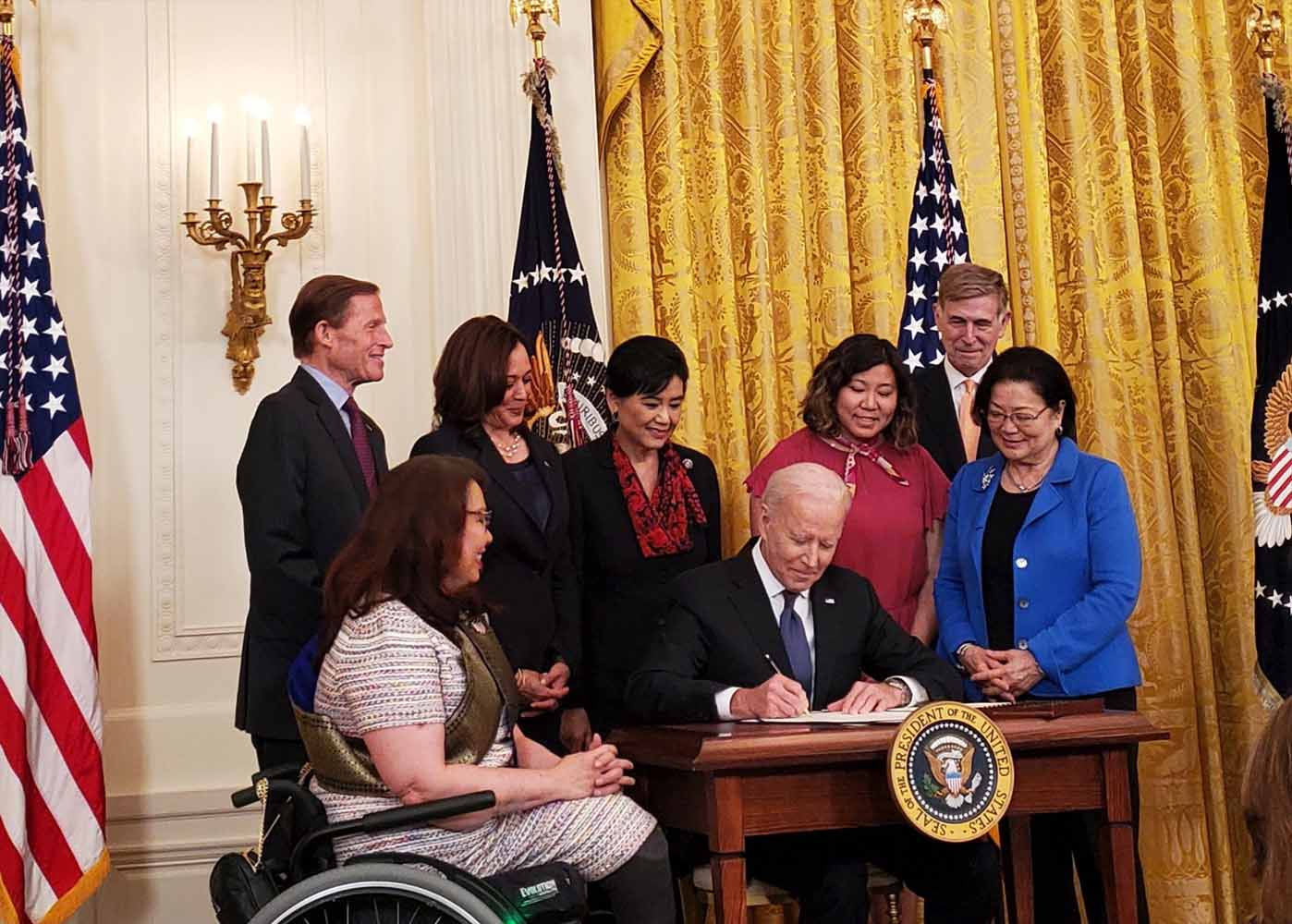
President Joe Biden signed legislation on Thursday, May 20 seeking to address anti-Asian hate crimes that have risen since the start of the coronavirus pandemic.
The signing came two days after the House of Representatives passed the COVID-19 Hate Crimes Act, a bill introduced by Rep. Grace Meng (D-N.Y.) and Senator Mazie Hirono (D-Hawaii), in a 364-62 vote, with the opposing votes coming from Republican lawmakers. The Senate passed the bill last month, with a 94-1 vote.
“My message to all of those who are hurting is: We see you and the Congress has said, we see you. And we are committed to stop the hatred and the bias,” Biden said in his remarks prior to the bill’s signing at the White House.
The bill addresses issues, such as the underreporting of incidents and crimes and the lack of language access and cross-cultural understanding in legal proceedings.
It will create a position within the Department of Justice to expedite the review of hate crimes, and will provide grants to law enforcement agencies to investigate as well as collect data anti-Asian incidents.
“With the new law…the Department of Justice and our entire administration is going to step up. Right now, this is a critical problem of hate crimes being under-reported,” the president said.
The bill will also have community-targeted approaches, such as state-run hate crime hotlines and online reporting resources available in multiple languages, public education campaigns against anti-Asian hate.
The legislation will address the increase in anti-Asian hate by assisting policymakers to “determine where critical resources should be focused, identify trends that can be interrupted, and direct public education campaigns,” according to Rep. Jerrold Nadler (D-N.Y.), chairman of the House Judiciary Committee.
For her part, Vice President Kamala Harris said the bill “brings us one step closer in stopping hate, not only for Asian Americans, but for all Americans.” However, she acknowledged that hate and racism will not end with the signing.
“Here’s the truth: Racism exists in America. Xenophobia exists in America, antisemitism, Islamophobia, homophobia, transphobia — it all exists. And so the work to address injustice wherever it exists remains the work ahead,” she said.
Over 6,600 hate incidents and hate crimes against those of Asian descent have been reported by Stop AAPI Hate since March 2020, of which two-thirds were reported by women.
“The [Asian American] community is exhausted from being forced to endure this rise in bigotry and racist attacks,” Meng said.
Asian Americans Advancing Justice, a non-profit organization advocating for Asian American and Pacific Islander (AAPI) communities, is among the groups supporting the passage of the bill.
“Asian Americans Advancing Justice | AAJC supports efforts to confront and uproot the systems of white supremacy that feed into the historic targeting, over-policing, and criminalizing of communities of color in the United States,” AAJC said in a release.
“Accurate data on hate crimes, including for limited-English proficient community members, is a necessary first step to keep the government accountable to meeting the true needs of our communities.”
The National Filipino American Lawyers Association (NFALA) also supports the president signing the bill, with NFALA President Kristy Gonowon calling it “an important step in confronting the wave of racism and discrimination we’ve seen across the country in this past year.”
“Hate has no place in this country and AAPIs are just as American as everyone else,” Gonowon said in a statement.
Stop AAPI Hate, a national coalition that has been tracking hate incidents since the start of the pandemic, said the bill shows the government’s recognition of the plight faced by the AAPI community during the pandemic.
“The passage of the COVID-19 Hate Crimes Act demonstrates that the federal government recognizes the devastating impact of the pandemic-related racism and discrimination that the pandemic-related racism and discrimination that the Asian American and Pacific Islander community is facing,” Stop AAPI Hate said in a press release.
However, the organization has also voiced its concerns with the bill, such as its exclusion of “serious hate incidents” and only including hate crimes. Hate incidents were an “overwhelming majority” of the experiences reported to Stop AAPI Hate.
More than 100 Asian American and LGBTQ organizations previously released a statement opposing the bill, arguing it “relies on anti-Black, law enforcement responses to the recent rise in anti-Asian bias incidents across the U.S.,” as published on the blog Reappropriate.
The groups said the bill contradicts Asian solidarity with Black, Brown, undocumented, trans, low-income, sex worker, and other marginalized communities whose “liberation is bound together.” Since many who are part of Asian communities also belong to other marginalized groups, the coalition said approving the bill would not keep all Asians safe.
Biden and Harris visited Atlanta back in March to meet Asian-American leaders where the President called on Congress to “swiftly pass the COVID-19 Hate Crimes Act” after the shooting of three massage parlors, causing the deaths of eight people, six of which were Asian women.
“Asian Americans have been screaming out for help,” Meng said. “And the House and Senate and President Biden have clearly heard our pleas.”
During his first week in office, the president signed an executive order, which included directives to remove language in federal actions or documents that would contribute to xenophobia and racism against the AAPI population and for the DOJ to expand its collection of data and public reporting regarding hate incidents against community members.
After the March 16 shootings that left eight individuals, including six Asian women dead, the White House also announced a host of actions, including re-establishing the White House Initiative on AAPIs and funding programs to help domestic violence and sexual assault victims.






